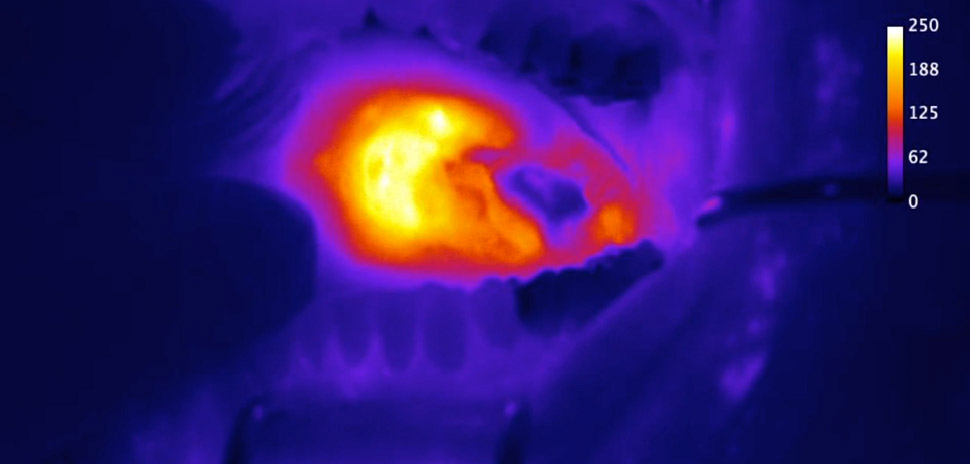Southlake-based OncoNano Medicine—a clinical-stage company that uses molecular cooperativity in drug design to diagnose and treat cancer—today announced it is expanding its collaboration with UT Southwestern Medical Center (UTSW). The multi-year collaboration will focus on discovering and conducting research of novel cancer therapeutics that leverage OncoNano’s nanotechnology platform—which can “light up” cancer for real-time surgical imaging.
OncoNano will sponsor research efforts in the laboratory of UTSW’s Professor Jinming Gao, with the goal of uncovering new cancer therapies that can benefit from OncoNano’s ultra pH-sensitive polymeric micelles.
In return, OncoNano will have an exclusive option to license new technology arising from the research conducted under this agreement.
“We’re excited to expand our research collaboration with the UT Southwestern Medical Center and the prominent UTSW laboratory led by Dr. Jinming Gao,” said OncoNano CEO Martin Driscoll, in a statement. “UTSW’s rich scientific discovery environment combined with world-class translational research capabilities presents a wonderful opportunity for our scientists to engage in a multi-year cooperative research effort to leverage our core technology platform and advance more novel cancer therapeutics into clinical development.”

OncoNano’s technology visualizes a tongue carcinoma in real time during a surgery in a Phase 1 clinical trial. [Image: OncoNano]
Dr. Gao and his team invented the technology
UTSW’s Dr. Gao and his team invented the ultra pH-sensitive nanoparticle technology that represents the core of OncoNano’s differentiated oncology research platform.
“OncoNano’s multi-year support for basic research will broaden our capability to harness molecular cooperativity design that incorporates pathophysiological responses into the development of tumor-activatable compounds with increased therapeutic windows,” said Dr. Gao, professor of oncology, pharmacology, and cell biology at UTSW’s Harold C. Simmons Comprehensive Cancer Center.
Dr. Gao is also chief scientific officer of OncoNano.
“We’re working to expand the micelle technology platform developed at UTSW so it can be used to deliver additional payloads,” Dr. Gao said in the statement, “including protein therapeutics such as cytokines, checkpoint inhibitors, and bispecific antibodies. We look forward to this research collaboration with OncoNano Medicine to continuously translate lab discoveries into potentially important clinical applications.”
OncoNano is advancing two development programs
OncoNano is currently working on two development programs that leverage the ultra pH-sensitive nanoparticle technology.
Pegsitacianine—a fluorescent nanoprobe for real-time surgical imaging—is currently in Phase 2 clinical trials for multiple types of cancerous tumors.
ONM-501—a novel, dual-activating polyvalent STING (STimulator of INterfernoon Genes) agonist for immuno-oncology applications—is advancing toward its first in-human study, currently planned for early 2023.
Presenting at the World Molecular Imaging Congress
OncoNano will present at the World Molecular Imaging Congress on October 8th from 10 a.m. to 11:30 a.m.. The presenter, Dr. Jason Newman, will speak on “Fluorescence Image-Guided Surgical Resection of Solid Tumors Using the pH-Responsive Micellar Imaging Agent Pegsitacianine: A Summary of an Ongoing Phase 2 Study.” This year’s WMIC is being held virtually from October 6-9.
OncoNano raised $50M in Series B funding in June
In June, OncoNano raised around $50 million in Series B financing to continue the momentum of its technology. The investment was led by the healthcare investment team at Advantech Capital, a private equity fund based in China that focuses on growth opportunities in TMT, pharmaceuticals, and healthcare.
Part of the funding will support OncoNano’s Phase 3 clinical trials in the U.S. and Europe for pegsitacianine. OncoNano calls the trials “pivotal.”
Previous funding
In August 2020, OncoNano received a $10 million grant from the Cancer Prevention and Research Institute of Texas (CPRIT) to expand uses for its innovative lead product, OHM-100, that “lights up” a tumor to distinguish it from normal tissue.
OncoNano had previously been awarded two other CPRIT grants: a $15.4 million grant in August 2019 to advance ONM-500, an oncology product that also built on the company’s proprietary pH-sensitive technology, and a $6 million grant in 2016 to advance ONM-100.
In May 2018, OncoNano received $11.7 million in Series A financing. This was followed by an additional $23.7 million in a second round of Series A financing, bringing the Series A total to $35.4 million. Both transactions were arranged by Salem Partners, which also participated as a principal investor.
![]()
Get on the list.
Dallas Innovates, every day.
Sign up to keep your eye on what’s new and next in Dallas-Fort Worth, every day.





































































